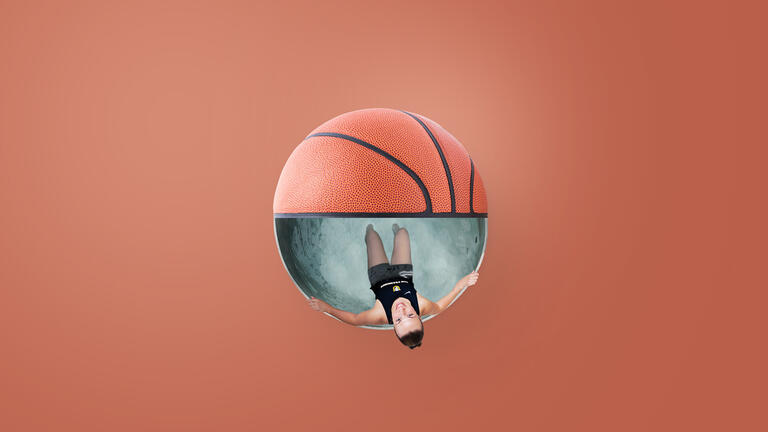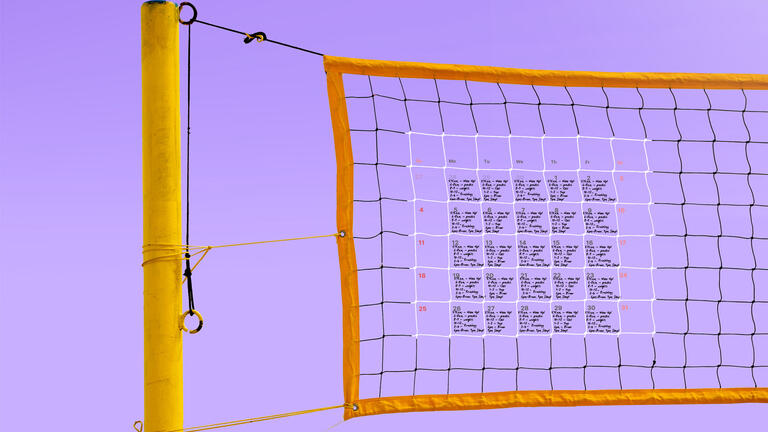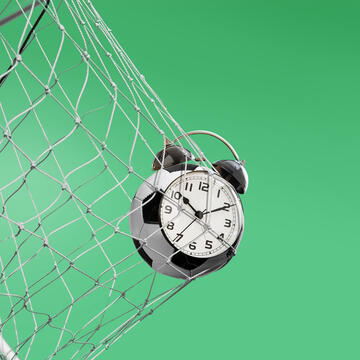

Drop the Routine
There are 250 athletes at USF competing in 14 Division I sports, ranging from baseball to beach volleyball. How do they stay fit? Avoid injuries? Maintain their mental fortitude?
Here, 10 athletes share the habits that are key to their success.
Eat to Stay Energized

Making the transition from being a high school athlete to a college competitor can be tough, says marketing major Aidan Oliver ’25. Especially when you cook for yourself.
“In golf, it’s long days,” he says. “We can spend seven or eight hours golfing. I was undereating and not energizing myself enough. I never was eating to benefit me.”
After meeting with the Athletics nutritionist at USF, Oliver said he learned about the breakdown of healthy fats, carbs, and proteins.
“I’ve gotten my daily habits down to veggies, a protein, rice, or pasta,” Oliver says. “I cook rice, ground beef, add a little honey and soy sauce and a full avocado on top and grilled onions. I feel like I’ve gotten into the best shape I’ve been in my whole life.”
Sophia “Saffy” Priester-Veasley ’26, a sociology major who runs the 4x100 relay and the 60-meter indoor, says she changed how she eats to improve her performance.
“I no longer have to eat chicken tenders and fries every day to feel happy,” she says, laughing. “I’ve definitely grown over the three years I’ve been at USF. Now, it’s about what my body needs.”
For Priester-Veasley, who’s started meal prepping for the week ahead on Sundays, that means less fried food and more fresh fruit, like strawberries (sometimes with Nutella).
Make Time for Recovery
The athletes say it’s important to plan for recovery after regular workouts, weightlifting, and cardio.
“I use ice baths,” says Cami Fulcher ’24, MA ’26, a guard on the women’s basketball team who started at USF as a walk-on and was awarded a scholarship to play all four years. “The first two minutes are hard, but the next eight minutes are OK.”

Riana Mission ’25, a golfer and data science major who was invited to play in last month’s Augusta National Women’s Amateur, says she also uses the ice bath, but she prefers the Normatec compression boots that help her legs recover, especially after walking 36 holes of golf at an 11-hour tournament.
“My scores have stabilized really well, and I’m playing well,” Mission says. “I’ve developed a lot over my four years here, and I feel like taking advantage of the resources that USF offers us helped me to find my footing.”
Prioritize Mindfulness

At USF, student-athletes have access to mental performance coaches to help them work through stress. Most of the athletes we talked with have developed mindfulness routines to help them manage.
Robbie Beasley ’24, MA ’26, a guard on the men’s basketball team, says he started journaling. A speaker in his personal branding class recommended it.
“I write about how I performed and keep track of my progress and make sure I’m trending in the right direction,” Beasley says. “It also helps me outside the sport. I write about values, how things make me feel.”
Working with the mental performance coaches to learn stress management has helped Trevor Harmon ’27, a marketing major who plays first base and catcher for the baseball team.
“The more you can tell yourself positive thoughts, the better for you,” Harmon says.
“I’ve noticed more success when I’m not obsessed with what’s happening on the baseball field,” he says. “Being able to focus on the baseball field, or on school, and pour everything I have into it is helping me. At home, I’m going to use that time to hang out and get my mind off baseball.”
Work on Time Management

McKenna Towne ’26, a kinesiology major who plays beach volleyball, remembers her first year as a USF athlete being a struggle. She was tired all the time, her body hurt, and her day started at 5:15 a.m. with a two-hour practice. By the time she got to class, she needed a nap.
“For me, it’s time management,” Towne says. “I find I underperform if I’m really stressed, either schoolwork-wise or performance-wise.”
Now, Towne plans out her schedule, including meals, practices, school, and sleep. It’s helped, she says.
This spring, Carter Lewis ’25, a finance major who runs cross country and track, had his fastest time in the 800 meters in four years. He also set up a plan.
“This semester I tried something new, because I was really inconsistent when I used to go to the grocery store,” he says. “I created a Google doc and made a meal plan for every day of the week — breakfast, lunch, dinner. From that, I know everything I need to buy and cook for the week. That’s helping me.”
Get Good Sleep

If you’re out in the evening with Ellie Weissenberg ’26, a finance major and midfielder for women’s soccer, you might notice her checking the time.
“My sleep is pretty important,” Weissenberg says. “My alarms go off at 5:30 or 6 a.m., so I do the math each night to get the eight hours. I try to be done with dinner early and relaxing [afterward] to give myself time to unwind before sleep.”
Isaiah Easley ’26, a psychology major and forward/striker for men’s soccer, says sleep is important after a tough workout or game.
“The main thing is sleep,” Easley says. “That’s where all your recovery is. I try to sleep nine hours a night. It can be hard with school and sports, but I do it.”


